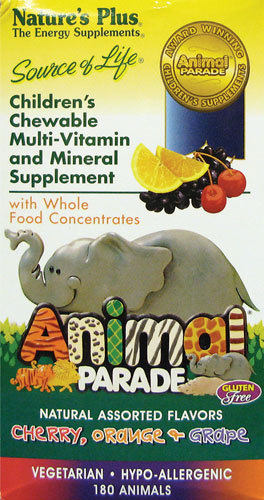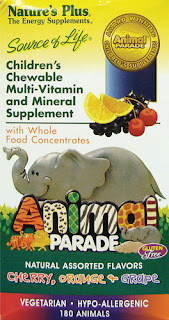CHILDRENS CHEWABLE VITAMINS SOURCE OF LIFE ANIMAL PARADE
EditDeciding if Your Child Needs a Multivitamin
 Look at your child's diet. Many times, a multivitamin isn't needed as long as your child is eating a healthy diet. Even if your child is picky, it's likely they are getting what they need from their diet, even if they aren't eating as many vegetables and fruits as you'd like.[1]
Look at your child's diet. Many times, a multivitamin isn't needed as long as your child is eating a healthy diet. Even if your child is picky, it's likely they are getting what they need from their diet, even if they aren't eating as many vegetables and fruits as you'd like.[1]- For instance, many foods are fortified with vitamins, such as milk and cereals.
- However, if your child has a very strict diet, a multivitamin may be appropriate. A diagnosis of anorexia, failure to thrive, or simply following a vegan diet are all good reasons for your child to take a multivitamin.[2] "Failure to thrive" is a specific, potentially quite serious diagnosis that means a child isn't growing and gaining weight as expected, which can be caused by sickness or food problems.[3]

 Consider individual supplements instead. Your kid is likely getting plenty of vitamins from diet, but they may be missing out on a key few. The vitamins most children are at highest risk of deficiency in are: vitamin D, calcium, and omega-3 fatty acids.[5]
Consider individual supplements instead. Your kid is likely getting plenty of vitamins from diet, but they may be missing out on a key few. The vitamins most children are at highest risk of deficiency in are: vitamin D, calcium, and omega-3 fatty acids.[5]- A fiber supplement may also be a good idea for some kids.
- Discuss the appropriate dose with your doctor, as each kid is different. For instance, by some recommendations, kids 1 to 4 years of age should be receiving a supplement of 10 micrograms of vitamin D, but that might not be the case for your kid.[6]
EditPicking Out a Multivitamin
EditKeeping Kids Safe




 Watch for signs of an overdose. If you suspect your child has eaten too many vitamins, you should be on the lookout for symptoms of overdosing. The most likely vitamins to lead to an overdose are iron, vitamin B6, vitamin B3, vitamin E, vitamin K, vitamin D, and vitamin A.
Watch for signs of an overdose. If you suspect your child has eaten too many vitamins, you should be on the lookout for symptoms of overdosing. The most likely vitamins to lead to an overdose are iron, vitamin B6, vitamin B3, vitamin E, vitamin K, vitamin D, and vitamin A.- The symptoms you should look for include bleeding issues (vitamin K and E), flushed skin (vitamin B3), difficulty walking and numbness (vitamin B6), trouble seeing and klutziness (vitamin A), and stomach issues like nausea, cramps, and vomiting (iron).
- Seek medical care if you notice any of these symptoms in your child. Call your child's pediatrician or poison control.[13]















No comments:
Post a Comment